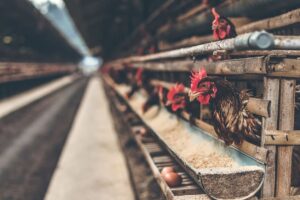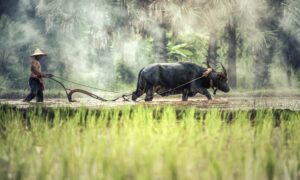From Farmworker to Olympian to Activist: A Boxer Fights for His Community
Jose Ramirez could have walked away from Avenal, Calif., where the jobs are drying up like the ground, but he's determined to save his community. Boxer Jose Ramirez makes his way to a fight against France's Rachid Azzedine before a lightweight 60-kg preliminary boxing match at the 2012 Summer Olympics in London. AP/Patrick Semansky
Boxer Jose Ramirez makes his way to a fight against France's Rachid Azzedine before a lightweight 60-kg preliminary boxing match at the 2012 Summer Olympics in London. AP/Patrick Semansky
By Mark Whicker
The bell peppers are at the bottom of the stalk, sometimes hidden in the leaves. Jose Ramirez would get through four or five hours bending over to pick them. After that his lower back would start barking, and then he would sink to his knees at every stalk.
“You get up at 4:30 in the morning and you go by the gas stations and see how many people are waiting for a ride to work,” Ramirez recalled recently for Truthdig, smiling. “It’s not the kind of job where you make an application. You just get in the truck and go.”
He grew up in Avenal, Calif., right beside Interstate 5, a Central Valley town of nearly 13,000 residents. Over 4,000 of those reside in the state prison.
A good week in the fields, where Ramirez and his father Carlos and his mother Juanita worked, would bring $400. Now those jobs are drying up like the ground.
A water bond issue will appear on this November’s ballot, but Sacramento can’t agree on how much it provides and whom it benefits. Lobbyists converged. Very few of them have a close relationship with the issue, leaf by stem, as does Ramirez.
None are U.S. Olympic boxers, either. Ramirez went to the Games in 2012. He improved to 11-0 with eight knockouts as a pro in the 140-pound division by beating Alfred Romero in a unanimous decision Saturday in Las Vegas. In October, he will stage a “Fight for Water” boxing card in Fresno.
Although he trains in Hollywood and no longer makes a living with a backbone and bucket, the 21-year-old Ramirez visits Avenal frequently. He has ridden buses to Sacramento with the farmworkers, visited lawmakers and has dedicated his fights to their cause. He has an impressive corporate sponsorship base for a boxer so young. His picture was even used on a Discover card during the Games.
Yet his firsthand story is more compelling. And it’s a rare piece of clarity in an issue that cannot be simplified by passion alone.
An $11.2 billion water bond was approved by California legislators in 2009 but was not brought to the ballot because of the state’s tough financial situation. The budget is balanced now and things are better, but Gov. Jerry Brown has suggested narrowing the scope of the bond on the November ballot to $6 billion to make it palatable to lawmaker and voter.
The California Latino Water Coalition, chaired by comedian/actor Paul Rodriguez and a group that has embraced Ramirez, calls for more water storage facilities, meaning dams and reservoirs, which are opposed by environmental groups because they endanger species. Those groups have shut down such plans before.
Mario Santoyo is a director and the technical adviser at the CLWC. In a recent interview with Truthdig, he called it “ironic” that two logical Democratic constituencies — environmentalists and Latinos — are squaring off.
If the lawmakers don’t agree on a dollar figure, the bond will be for $11.2 billion when presented to the voters in November.
“People are being fined by the Water Resources Board, they’re watching their homes become endangered by forest fires, they’re losing jobs in the fields,” Santoyo said. “Everyone is being hurt in some way by this drought. Polling shows that it would get 50 to 53 percent of the group [at $11.2 billion], which some people think is too close. I think that’s a good starting point [50 percent] for the support we’ll get.”
Santoyo estimates that there are 200,000 idle acres created by the drought, which means job and food loss. From the citrus growers on the east side of the Central Valley to the ranchers who have had to remove their water-intensive almond trees, the total revenue loss might reach $3 billion this year.
Ramirez was riding from Las Vegas to Avenal after the Olympics with his manager, Rick Minigian, who also grew up in the valley. They looked at the cracking ground and the stunting plants, and Ramirez pledged to stand up.
He has two brothers and a sister and began picking crops when he was 14. Carlos now drives a truck that carries pesticides; Juanita, who broke her arm in an auto accident when she was five months pregnant with Jose, takes care of the house.
Ramirez kept working in the fields as he began to box. He started at age 9 at a gym run by sheriff’s deputies a block and a half from home. Armando Mancinas, whom Ramirez calls his “godfather,” came over from his job at the prison to help coach.
“I won my first trophy and that’s what I decided to do,” Ramirez said. “Because my soccer and baseball trophies were pretty small and this boxing trophy was real big. That’s why I decided to keep boxing, and pretty soon I was going to national tournaments. One of my teachers gave me my first boxing shoes.”
Santoyo says Ramirez’s real fight will consume “a lot more rounds” than boxing does. He also recognizes that Ramirez could have kissed Avenal goodbye long ago.
“He’s fighting for a way of life,” Santoyo said. “People don’t understand when they see us in the fields. I have a master’s in civil engineering. My brother is a doctor. For us this was a steppingstone. For Latinos, this is something to take pride in. It’s acceptable work.”
Mark Whicker was a sports columnist at the Orange County Register for 27 years. Twice he was named one of the top 10 sports columnists in the U.S. by The Associated Press Sports Editors.
Your support matters…Independent journalism is under threat and overshadowed by heavily funded mainstream media.
You can help level the playing field. Become a member.
Your tax-deductible contribution keeps us digging beneath the headlines to give you thought-provoking, investigative reporting and analysis that unearths what's really happening- without compromise.
Give today to support our courageous, independent journalists.






You need to be a supporter to comment.
There are currently no responses to this article.
Be the first to respond.